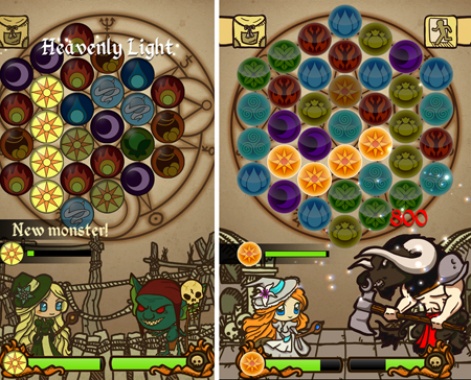Making sure you start the year in style, Pocket Gamer Connects London is happening on 13-14 January 2015 at Vinopolis.
And tickets are available now.
So to give you a hint at what you can expect, we're shining the spotlight onto our speakers to provide a deeper look at the personalities who will be taking the stage at PG Connects London 2015.
World of possibilities
Shintaro Kanaoya is the founder of Chorus Worldwide, a specialist mobile games publisher, focused on taking Western-developed titles to Asia.
Founded in 2014, Chorus has published Glyph Quest and The Secret of Raven Rock in Asia (both UK-developed), and will publish a further four titles in 2014.
Prior to Chorus, Shin spent 5 years at Microsoft, as Director of Business Strategy for Rare, and then the Sports Entertainment Group. Before Microsoft, Shin had various roles at EA and EA Studios, including as a designer at Bullfrog, and marketing lead for DICE.
Pocket Gamer: We're showcasing the Best of British at Pocket Gamer Connects so how much of an impact have British game developers had in your gaming life?
Shintaro Kanaoya: British games have been pretty much my whole life. I got into games originally via Nintendo Game & Watch, but as soon as I got a Spectrum, the world of games opened up for me.
Jetpac was the first game that really blew me away - I remember calling my mum at work to tell her how amazing it was!
My first job in the industry was with Bullfrog, working on Syndicate Wars, then Dungeon Keeper, and I always loved the sense of humour, the sense of the macabre, in all those games. I was fortunate enough to also work at Rare later on, so I guess I'm one of the few people to have worked at both of those iconic British game studios.
Why is user acquisition such a challenge in the mobile business today and what can games companies do to give themselves a fighting chance?
There are more gamers and more developers than ever before, so you'd think that there'd be enough audience out there for everyone. But the reality is that getting noticed by an audience of 3 billion smartphone users comes down to either appearing on the storefront, or having a lot of money to get in people's faces.
It's important to be very focused on whom you're making the game for.Shin Kanaoya
The vast majority of user spend pools around a handful of titles, and as we've seen over the last year, the titles at the top hold onto their positions more intractably than in the console business.
It's important to be very focused on whom you're making the game for, and what they want from it. You can potentially figure that out later, if you're making your passion project and you don't yet quite know. But once you know, you have to be laser focused on those users and figure out how to reach them.
Are you using all the free channels at your disposal via social networks? Are you on the right forums?
Ultimately, you have to be honest with yourself and ask whether you've made something that anyone really needs to sit up and take notice of. The democratization of game development is a wonderful force, but it
- a) brings in so many more developers who are competing with you and,
- b) can be an excuse to be undisciplined about what you're making.
Developers have a right and an ability to make what they want - that doesn't mean the audience has to care about your baby. A laser focus on the audience, understanding who they are, where they live, and how they monetize, is more important than ever before.
What are the major challenges currently facing games businesses when publishing abroad?
Smartphones are so ubiquitous now, they're part of the culture. That's never happened before. $400-$500 consoles and $70 games creates a filtering process where only the most devoted fans will form the audience.
But with smartphones, and smartphone gaming being part of the culture, the cultural mores in each country play a huge part in what titles users select to download, as well as which titles the platform holders choose to feature.

While not a game, one of the most downloaded apps in China was the China Air Quality app. It's totally irrelevant anywhere else, but of paramount importance to users in China. Games aren't that different. As smartphone games are now played by everyone, and are seen as entertainment/distraction first, cultural touchpoints and familiarity play a key part in whether a game will resonate with an audience or not. This isn't just in the game itself, but also how it's presented and marketed.
Without an understanding of this, getting games to succeed overseas is incredibly hard.
How can indie developers adapt to survive in the mobile economy?
Accept that mobile gaming is a different beast, and embrace it. The audience is different, the key players are different, and what people want out of mobile games is different. Accept that the premium model is a tough business. A 69p paywall is not 3x20p pieces and some coppers - it's a massive psychological hurdle and a huge barrier to entry.
A 69p paywall is not 3x20p pieces and some coppers - it's a massive psychological hurdle.Shin Kanaoya
We're now in a world where people want to get into the party first before deciding whether it's worth sticking around and buying a drink. Who likes cover charges to get into a pub? Let them in, soak up the ambience, and then give them opportunities to enhance the experience. Embrace other monetization methods like ads.
Also, spend time thinking about your business, not just your game. Do you have enough money to make what you want, or are you going to need to compromise? How can you reach out to investors? How can you make compromises now rather than later?
Partner with people that can help you do things you can't - whether it's enlisting the help of a coder/artist/musician, or whether it's getting yourself in front of a publisher to go to new markets you can't reach by yourself.
Will new technology like wearable tech and VR change the mobile landscape?
Watches could become a cultural phenomenon and that could lead to interesting new games, even more focused and distilled than smartphone games.
VR will likely be for the core, again because of the self selection process that happens when a $200 headset goes on sale for a $400 console.

Mobile's great strength is just that - mobility. That's what's made it a cultural phenomenon, the ability to do almost anything from a small device in your pocket. I can't see too many people walking around with VR headsets!
What are you most looking forward to at Pocket Gamer Connects?
As always, great new games, the wealth of creativity that shows up at these events always impresses me.
The industry continues to evolve at such a pace that I'm always fascinated by the new publishers and service providers that show up. A year ago, Vungle wasn't a huge deal, but it is now. What will be there this year that has the potential to be the next Vungle in a year's time?
What's your prediction for the mobile gaming industry in 2015?
More consolidation, more majors diverting more resources into mobile, spending more on marketing and user acquisition, creating even more revenue inequality between the top and the bottom.
But also, (and this may be more wishful thinking) niches of audience becoming more apparent and self-identifying, making them easier to reach.
Right now, there's still a sense when you go to the app stores or read a site about mobile games that every different type of dish is being served. But I think gamers want to know where to go to find the rock, the reggae, the jazz, etc.
Now that smartphone gaming is truly at a cultural scale, I'd expect and hope that those people that are truly into playing games on mobile become more curious about other games they might like.

Grab your tickets for Pocket Gamer Connects London 2015 here!
Don't forget to keep up-to-date with content from our speakers via the Speaker Spotlight hashtag.
And you can check out speaker talks from PG Connects Helsinki 2014 here.





















